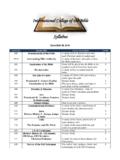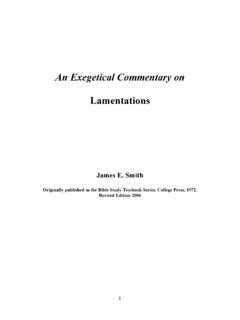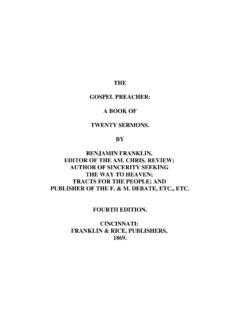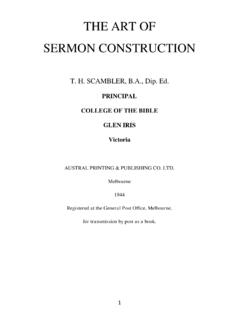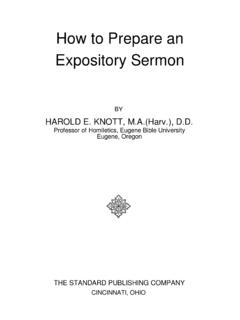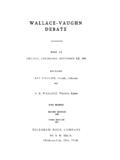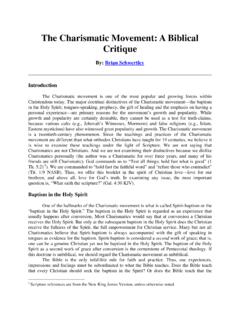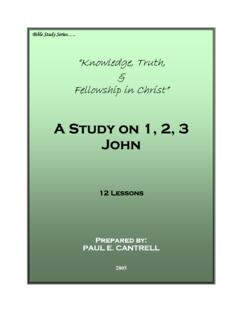Transcription of NEW TESTAMENT GREEK FOR BEGINNERS - ICOTB
1 NEW TESTAMENT GREEK FOR BEGINNERSNEW TESTAMENT GREEK FOR BEGINNERSB YJ. GRESHAM MACHEN, , of New TESTAMENT in Westminster Theological Seminary, PhiladelphiaTHE MACMILLAN COMPANY Copyright, The Macmillan Company, 1923 All rights reserved. No part of this book may be reproduced or utilized in any form or by any means, electronic or mechanical, includ ing photocopying, recording or by any infor mation storage and retrieval system, without permission in writing from the 626364 year 6789 Copyright renewed, 1951, by Arthur W.
2 MachenThe M acmillan Company Collier-M acm illan Canada, Ltd., Toronto, OntarioPrinted in the United States of Am ericaISBN - 5-3734 flD --c)TO M Y MOTHERPREFACEThis textbook is intended primarily for students who are beginning the study of the GREEK TESTAMENT either with out any previous acquaintance with the GREEK language or with an acquaintance so imperfect that a renewed course of elementary instruction is needed. Owing to the exigencies of the present educational situation, many who desire to use the GREEK TESTAMENT are unable to approach the subject through a study of classical Attic prose.
3 The situation is undoubtedly to be regretted, but its existence should not be ignored. It is unfortunate that so many students of the New TESTAMENT have no acquaintance with classical GREEK , but it would be still more unfortunate if such students, on account of their lack of acquaintance with classical GREEK , should be discouraged from making themselves acquainted at least with the easier language of the New New TESTAMENT usage will here be presented with out any reference to Attic prose. But a previous ac quaintance with Attic prose, even though it be only a smattering, will prove to be an immense assistance in the mastery of the course.
4 By students who possess such ac quaintance the lessons can be covered much more rapidly than by mere book is an instruction book, and not a descriptive grammar. Since it is an instruction book, everything in it is made subservient to the imparting of a reading acquaint ance with the language. In a descriptive grammar, for example, the rules may be formulated with a lapidary succinctness which would here be out of place. The effort is made here to enter upon those explanations which the fifteen years experience of the author in teaching New TESTAMENT GREEK has shown to be essential.
5 In a descrip viiV1 UPREFACE tive grammar, moreover, the illustrations would have to be limited to what can actually be found in the New Testa ment, but in the present book they are reduced so far as possible to an ideally simple form, which does not always appear in the New TESTAMENT books. In this way the vocabulary at every point can be confined to what the student has actually studied, and confusing footnotes can be avoided. It is highly important that only one gram matical point should be considered at a time.
6 An introduc tion of illustrations taken from the New TESTAMENT would often so overlay the explanation with new words and with subsidiary usages unfamiliar to the student that the specific grammatical point under discussion would be alto gether obscured. Of course, however, the effort has been made not to introduce into the illustrations any usages ex cept those which are common in the New TESTAMENT character of the book as an instruction book has also determined the choice and order of the material.
7 The treatment has been limited to a few essential points, and no attempt has been made to exhibit the real richness and flexibility of the New TESTAMENT language, which can be discovered only through reading. This limitation may in places give rise to criticism, as for example in connection with the treatment of participles. The author is well aware of the fundamentally non-temporal character of the tenses in the participle, and also of the great variety in the shades of thought which the participle can express.
8 But after all it is highly important for the beginner to understand clearly the distinction between the present and the aorist participle, and that distinction can be made clear at the beginning only through the proper use of our temporal mode of thought. Only when what is simple and usual has been firmly impressed upon the student s mind by patient repeti tion can the finer and more difficult points be safely treatment of the participle, moreover, has been thrust as far forward as possible in the book, in order that ample time may be allowed for practising the usages which it involves.
9 Experience shows that in learning to read New TESTAMENT GREEK , the participle is almost the crux of the whole attention has been given to the exercises. Until the very last few lessons (and then only in the GREEK - English exercises) the sentences have not for the most part been taken from the New TESTAMENT , since the book is intended as an instruction book in GREEK and not as a stimulus to memory of the English Bible. At a later stage in the study of New TESTAMENT GREEK , the student s memory of the English Bible is not an unmixed evil, for repeated reading of already familiar passages will often fix the meaning of a word in the mind far better than it could ever be fixed by the mere learning of a vocabulary.
10 But in the early stages, such assistance will do far more harm than good. In the exercises, the effort has been made to exhibit definitely the forms and grammatical usages which have just been discussed in the same lesson, and also to keep constantly before the mind, in ever new relationships, the most important usages that have been discussed vocabularies have been limited to words which are very common in the New TESTAMENT or which require special explanation. Everywhere the effort has been made to introduce the words in the illustrations and exercises.
